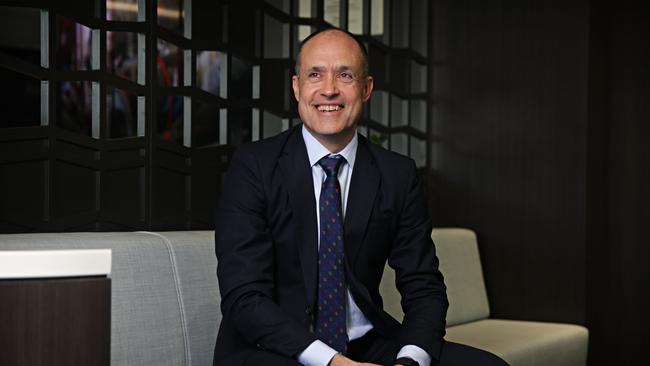NBN needs fibre upgrade, says Vodafone boss Iñaki Berroeta
Vodafone’s chief executive says the NBN needs a rapid upgrade that would bring it much closer to Labor’s original fibre vision.

Australia's broadband infrastructure needs a mass upgrade to that would bring it a lot closer to Labor’s original fibre NBN vision, Vodafone chief executive Iñaki Berroeta says.
And the upgrade needs to happen sooner rather than later, with the works requiring a collaborative effort from NBN Co and the telecommunications industry, he said.
Speaking at a trans-Tasman Business Circle virtual event on Thursday, Mr Berroeta said most Australian homes were connected with ageing copper-based NBN technology which will inevitably need to be upgraded.
"That's one of the challenges NBN is facing, to upgrade all of this infrastructure in the future. And that will need to happen sooner rather than later," Mr Berroeta said. "All of this will have to go to a modern fibre infrastructure.
"This pandemic has brought a lot of people working and studying from home. In a household you might have two people connecting to their workplaces, and two students connecting to their schools, and you see the limitations of the infrastructure Australia has.
"The need for fibre is there, and some countries are more advanced … New Zealand is one of them. As an industry, along with government, we need to find a path sooner rather than later."
Labor's original vision for the NBN was to connect most of Australia with full fibre connections, but the Coalition under Tony Abbott and his then-Communications Minister Malcolm Turnbull shifted the project in 2013 to a multi-technology mix, relying heavily on copper wiring.
In January NBN Co said it had upgraded 3000 premises originally assigned fibre-to-the-node technology to full fibre so they could achieve minimum speeds of 25 Mbps.
The COVID-19 pandemic has tested Australia's telecommunications industry, which is beginning to report traffic levels below its recent peak.
A monthly report from the ACCC on released on Thursday found that NBN speeds and performance deteriorated as Australians moved to work and study from home as lockdowns were put into place.
It found that average download speeds on NBN Co’s 50 Mbps and 100 Mbps speed tiers dropped by 14 per cent and 23 per cent, respectively, before NBN Co moved to offer 40 per cent extra free capacity to retailers.
It also found Vodafone, included for the first time in quarterly figures, achieved results comparable to other providers.
Mr Berroeta, who has been CEO since 2014, said it was clear early on that the pandemic was going to have a big effect on Vodafone Australia's business, and that before widespread lockdowns hit, an employee in the company's headquarters in North Sydney displayed symptoms of coronavirus after a trip to Japan.
"Within half an hour we sent everyone home. We had never sent a few hundred employees home on the same day before, without even doing a trial run. But the truth is that in that same evening everything was running exactly the same, and the next day was exactly the same," Mr Berroeta said.
"We surprised ourselves a bit with how little disruption this represented … The challenges came around contact centres, and retail.
"We're not so much interested in how much time people spend in the office at all. We don't encourage people to go to the office, it's about how much people create and collaborate with others, and the output. Not if you sit in the office for eight hours."
Vodafone's proposed merger with TPG recently received final regulatory approval, and Mr Berroeta said the merger made sense given the companies' complementary assets.
The merger is expected to be completed by July.
"TPG is very rich on fibre infrastructure and we were very rich on mobile infrastructure," he said. "The combination of these two things, and the spectrum for mobile networks, gives us the ability to be much more flexible with the solutions we can offer. "



To join the conversation, please log in. Don't have an account? Register
Join the conversation, you are commenting as Logout